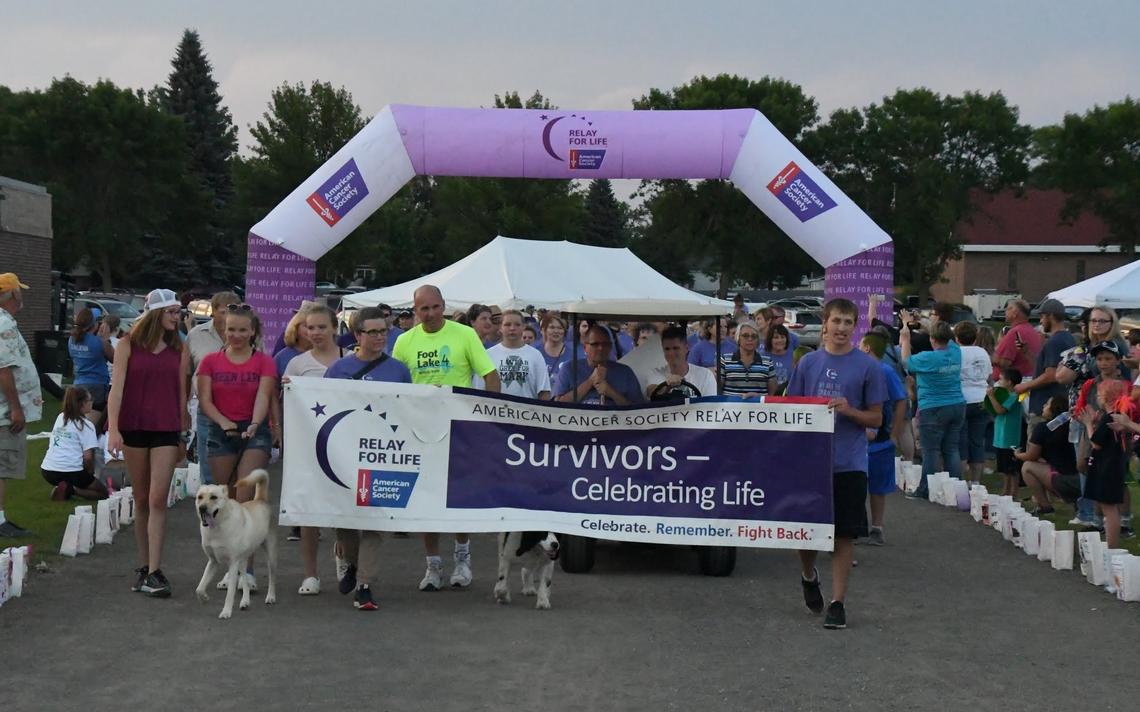Cancer society’s fundraising efforts struggle during pandemic
In its heyday, during the mid-2000s through about 2015, the annual Relay for Life fundraising event in Kandiyohi County took in upward of $100,000 year after year.
Funds raised provide needed support to cancer patients with extra expenses such as lodging and transportation. The funds also support research and education through the American Cancer Society.
In 2008, the local Relay topped out in excess of $150,000.
This year, the goal is only $50,000 – set prior to the pandemic outbreak. At this point less than $14,000 has been raised, leading up to tonight’s virtual Relay, according to Tanya Rosenau, a member of the event leadership team for Kandiyohi County.
Originally, the 2020 Relay for Life event had been set for the morning of Sept. 19 at the Kandi Mall in Willmar. “Campsites” and the luminary “track” were to be set up inside the mall, to avoid weather complications experienced in the past.
“Then COVID-19 changed everything,” said Rosenau.
While this year’s fundraising events have struggled amidst the COVID-19 pandemic, Sherri Maanum, Senior Community Development Manager and regional staff member with the American Cancer Society, said the national organization is $220 million behind budget.
The American Cancer Society has taken “major steps to cut expenses,” Maanum said, including placing 500 support staff on furlough and laying off one-third of the group’s staff across the nation. Some 100 offices have been closed. Minnesota is part of a 13-state northern region of the country. Fundraising goal for the 13-state northern region for 2020 is $212 million; for the three-state Minnesota, North and South Dakota hub, it is $3.2 million.
Challenges
“We have experienced trials, tribulations and challenges at all levels,” said Maanum.
But none more so than trying to assist cancer patients having to deal with delayed treatments.
“It’s heart-wrenching,” said Maanum. It’s not only dealing with cancer, but “it’s the mental wear and tear” of not being able to get the needed resources, to get treatment.
A survey conducted by the American Cancer Society in May showed 79 percent of cancer patients had delays in health care treatment; 17 percent in radiation, chemotherapy and hormone therapy treatments; 15 percent saw delays in inpatient surgery and 25 percent experienced delays in imaging services.
Currently, the numbers show 27 percent report delays of more than two weeks in cancer care and 19 percent are unsure when their care will be rescheduled.
In addition, 46 percent of cancer patients and survivors experienced a change in their ability to pay for care and 23 percent worry about losing their health insurance.
The emotional impact is even greater: 48 percent of cancer patients and survivors reported a negative effect on their well-being, 20 percent worry their cancer will grow or return due to challenges getting care and 67 percent worry about their ability to stay safe as social distancing measures relax.
“I don’t like it. I want it back the way it was,” Maanum said.
Even if they are having a “good day,” cancer patients are still scared when going to a store and heading out to get groceries. Even with pickup and delivery, that’s still not good enough, said Maanum. And that’s all on top of not being able to get treatment or see their doctor.
The American Cancer Society has been conducting research on a patient’s ability to build an immune system; to battle cancer and COVID-19 at the same time, she said.
“If funding isn’t there, we can’t even help them that way.”
Maanum said the American Cancer Society is doing its best to get on track with funding and to help cancer patients. “We need to let them know they are not alone in this,” said Maanum. “They are even more isolated now” with the pandemic.
“Every dollar counts,” she said. “Every single dollar makes a difference … every single one.”
Maanum said people often comment they can’t afford to give a larger amount, but they don’t realize it all helps; it all adds up.
Donations
Maanum said the “Stronger Together” campaign is at 38 percent of the annual goal of $3.2 million. Funds raised are used to support cancer research and to “bring awareness” and education to the community.
“Knowledge is power,” said Maanum.
Special focus in September is on pediatric cancer. October is making strides against breast cancer and November is no-shave November.
Donations received through Dec. 31 help this year’s campaign.
Donate online through the American Cancer Society website or the fundraising app, or by calling 320-295-2177 or contacting a Relay for Life participant.
For more information visit https://www.facebook.com/relayforlifeofkandiyohicounty/

Sherri Maanum, Senior Community Development Manager and regional staff member with the American Cancer Society
Source: West Central Tribune By: Sharon Bomstad
Support families fighting financial toxicity of cancer – here
